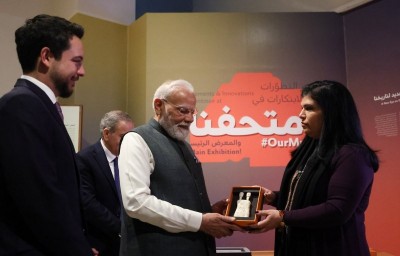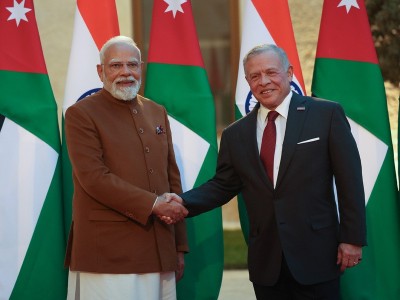SAARC nations finalized framework agreement for energy cooperation
The two days meeting concluded on Friday with the ministers’ assurance to get the SAARC Framework Agreement for Energy Cooperation (Electricity) approved from their respective Governments so that it could be signed during the forthcoming SAARC Summit scheduled to be held in November, 2014 in Kathmandu, Nepal.
India proposed to host the Seminar on “Sharing Experiences on Energy Pricing Mechanism in the SAARC Region”. India also proposed to host the Second Meeting of the Expert Group on Technology/Knowledge Sharing (including Energy Efficiency, coal, etc.) in 2015. Bangladesh will convene the Meeting of Energy Regulators /Bodies in SAARC countries by December 2014.
Earlier addressing the inaugural session of the 5th meeting of the SAARC Energy Ministers in New Delhi on Friday, Union Minister of State (I/C) for Power, Coal, New and Renewable Energy Piyush Goyal called for building SAARC power grid so that excess production of power in one region can easily be used to meet deficit elsewhere. Goyal said “Rivers can flow only in one direction, but power can flow in the direction of our choice! I dream of a seamless SAARC power grid within the next few years. For example : Hydroelectric power generated in North East India could be transported via Bangladesh, India and Pakistan, on to Afghanistan or offshore wind projects could be set up in Sri Lanka’s coastal borders to power Pakistan or Nepal. The possibilities are limitless!” Goyal said this will not only strengthen the economic ties among the SAARC nations but also deepens the people to people relationship.
The Power Minister further stated that the economic sustainability of SAARC region is pillared on energy security as 30% of the region’s energy demands are met through imports. In order to resolve this, Goyal advocated a three pronged strategy by leveraging (a) Harnessing conventional and renewable sources of energy (b) building inter-connected transmissions grids and forging efficacious power trading agreements. SAARC is a robust market but constraints are primarily on the supply side as there are pockets where deficits persist, Goyal said.
Highlighting the correlation between per-capita electricity consumption and Human Development Index (HDI), Goyal said that the impact of electricity on human lives is profound ranging from healthcare to education to employment opportunities. The household per capita consumption of electricity within SAARC is mere 128 units versus global average of 3,045 units. Goyal called upon all member countries to take this as a challenge and we all should commit over selves for pushing up household per capita consumption. For rapid progress and prosperity of the SAARC region, it is imperative that the power sector be expanded to ensure universal access to electricity in the region, Goyal added.
Giving details of intra-SAARC linkages established in the recent past, Goyal gave examples of 1450 MW exchange between India and Bhutan, 500 MW between India and Bangladesh and 150 MW between India and Nepal. He said more interconnections with high capacity are being planned and implemented. Goyal urged the member countries to develop more such interconnections and offered India’s help to enhance production capacity so that member countries become exporters in the region.
Goyal said that SAARC has always played an important role in India’s foreign policy but the commitment was reaffirmed and revitalized after the formation of new Government led by Prime Minister Narendra Modi. He said “Our Government recognizes the enormous potential of SAARC nations and we believe SAARC can be regional economic powerhouse.”
Earlier, Secretary General of SAARC Secretariat Arjun B. Thapa opened the meeting with his address. Apart from the host country India, Energy Ministers and senior officials from the SAARC member countries, viz, Afghanistan, Bangladesh, Bhutan Maldives, Nepal, and Sri Lanka are participating in the meeting. Goyal was unanimously elected as a chairperson at the meeting.
The Member States apprised the Meeting of the initiatives taken with regard to Renewable Energy projects. The Meeting referred the matter to the Expert group on Renewable Energy for further deliberations.
The meeting approved the 8 reports of earlier meetings of the Working Group on Energy, separate Expert Groups on Electricity, Technology and Knowledge Sharing, Renewable Energy and the reports of the Inter-governmental Meetings on “Study on South Asian Regional Power Exchange”, organized by ADB.
The Indian side presented two Concept Reports namely, “Framework for planning cross-border transmission links and associated system strengthening through joint system studies” and “Operation of stable and secure SAARC Electricity grids”. Bangladesh has also prepared the Concept Paper on “Structures, functions and institutional mechanisms for SAARC regulatory issues on electricity exchange/trade” and the same would be circulated among Member States, shortly. Member States will offer their views/comments on the Concept Papers by 31 December 2014. The next meeting of the SAARC Energy Ministers’ will be held in Nepal.
The South Asian Association for Regional Cooperation (SAARC) was established in 1985, with its Secretariat in Kathmandu, Nepal. The process of regional cooperation in energy sector began in January 2000 with the establishment of a Technical Committee on Energy. Thereafter, through the Islamabad Declaration at the 12th SAARC Summit in 2004, the Ministerial level Energy Forum was constituted.
The First Meeting of the SAARC Energy Ministers was held at Islamabad in 2005. This was the fifth meeting of the Energy Ministers held after a gap of three years. This meeting was preceded by Secretary level SAARC Senior officials meeting on 16th October 2014.
Support Our Journalism
We cannot do without you.. your contribution supports unbiased journalism
IBNS is not driven by any ism- not wokeism, not racism, not skewed secularism, not hyper right-wing or left liberal ideals, nor by any hardline religious beliefs or hyper nationalism. We want to serve you good old objective news, as they are. We do not judge or preach. We let people decide for themselves. We only try to present factual and well-sourced news.






